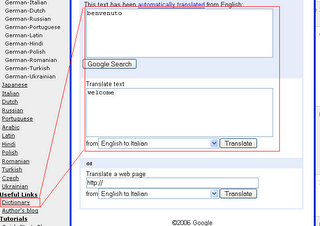Our volunteers have always been our strength. A huge portion of all
Internet Polyglot lessons has been created by them and we are all very grateful to them. Today I have loaded new,
Ukrainian lessons and they are now available for the public view.
These lessons are a product of the best example of team work. They were created by my good friend Jenia, and her friends from Ukrain Tatiana and Slava. Great work, guys! Your contribution to the world language learning community is priceless! Thank you from the bottom of our heart.
Now I would like to write a couple of words about the Ukrainian language and Ukraine. Ukrain is an East-European country located on the North of Black Sea bordering Russia, Belarus, Poland, Slovakia, Romania, Moldova and Hungary. Its capital is Kiev. Formerly, until 1991 it was a republic of USSR. Historically, it is considered the craddle of the Slavic civilisation - Kievan Rus existed in the Middle Ages.
Ukrainian language (украї́нська мо́ва,
ukrayins'ka mova ) is one of the Slavic languages most close to Russian, Belarus, Polish. The alphabet is cyrillic. There are about 40 million Urkainian speaking people in the world. Except Ukraine it is also spoken in Russia, Polan, Belarus, Canada, Moldova, Brazil and several other countries.
Ласкаво просимо! Welcome!And now our usual
joke of the day:
A man is driving down the road and notices a car in the ditch. He doesn't usually help many people so he drives on by. Then he notices that a pretty woman is the driver so he goes back to help.
As he is hooking his truck to her car he says, “You know, you are the first pregnant woman I've ever helped out of a ditch.”
“But I'm not pregnant,” she says.
“Well, you're not out of the ditch yet,” he says.
Roots and branches of the Ukrainian languageSlavonic languages are usually split up by linguists into three main groups, determined by their geographical position: Western, Southern and Eastern Slavonic. Despite sharing the same ethnical foundation and several linguistic similitudes there are also a number of easily spottable differences between these three main groups. It should be noted though, that regardless of the category their language is set under, Slavonic speakers can, for the most part, understand each other without the need of an interpreter. Even more so, once you’ve learnt a Slavonic language it will be extremely easy to pass onto another and become a true
polyglot in no time. That’s why learning Ukrainian is also important if you’re planning on learning another language from the Eastern Slavonic language tree, such as Russian or Belarusian.
Statistics and properties of the Ukrainian languageThe number of Ukrainian speakers is somewhere around 51 million people, of which 90% are concentrated in Ukraine. The other 10% make up the Ukrainian Diaspora, which is spread along several countries all across the World, such as Argentina, Belarus, Brazil, Canada, Hungary, Latvia, Poland, Romania, Russia and the United States.
From a structural point of view, Ukrainian resembles Russian mostly, from all the other Slavonic languages. Of course, this is also an effect of the Russian dominance over Ukraine as well as the constant influence of the Russian trade and migration in the area. Most linguists will agree that once you know either Russian or Ukrainian, it would only take a couple of months and a solid course to learn the other language. Therefore, it could even pass on as a waste not to learn the “complementary” language once you’ve already studied one of them.
Learning UkrainianIf you’ve decided to start studying Ukrainian on your own, from the warmth of your home instead of taking an organized
“Learn Ukrainian” course or something similar, there are a few methods at your disposal that can come in as rather useful. First of all, remember that the Internet is your friend and you can easily find
free Ukrainian lessons online, some of which may prove extremely useful while others will prove to be a waste of time. Don’t start one of these lesson courses before you make sure it’s exactly what you’re after and maybe scooping around to see what others have to say about them first.
Your second option is to start learning through some lighthearted
vocabulary games. Vocabulary games are a good choice for newcomers to the Ukrainian language that don’t have a basic set of known words already and want to have a foundation to
improve vocabulary upon. These games will help you
memorize words easier and some of them can help you out with spelling and even pronunciation, so you will hit more than one rabbit from one shot.
Articles about Ukrainian in different languages:Roots and Branches of the Ukrainian Language (in English)
Lengua Ucraniana (in Spanish)
Langue ukrainienne (in French)
Ukrainische Sprache (in German)
Lingua ucraina (in Italian)
Oekraïense Taal (in Dutch)
Língua Ukrainian (in Portuguese)
Radacinile si ramurile limbii Ucrainiene (in Romanian)
Корни украинского языка (in Russian)
جذور وفروع اللغة الأوكرانية (in Arabic)





